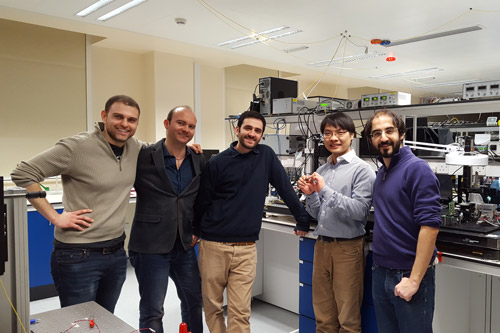Machine Learning Shows Potential For Improving Quantum Computers
Get Tom's Hardware's best news and in-depth reviews, straight to your inbox.
You are now subscribed
Your newsletter sign-up was successful
A team of researchers from the University of Bristol’s Quantum Engineering Technology Labs, in partnership with Microsoft and the Eindhoven University of Technology, used machine learning techniques to better understand a quantum computer.
Quantum Supremacy
Quantum supremacy will be the point in time when quantum computers will be able to solve certain problems much faster than even our fastest classical supercomputers can. Quantum computing experts have said that we should be able to achieve that with a quantum computer that has at least 45 qubits. Both Google and IBM plan to pass that goal in a few years.
Microsoft is also researching another type of quantum computer, called a topological quantum computer. This machine will use quasiparticles, called “anyons,” which form from the interactions inside matter. Microsoft’s quantum computing scientists believe that these quasiparticles will give much better coherency and stability to the qubits necessary to build their quantum computer, compared to alternative methods such as using superconducting qubits (Google, IBM), or trapped ions.
It’s not clear when Microsoft’s quantum computer will arrive, but the company believes it should now only be an engineering challenge, rather than a scientific one.
Machine Learning To The Rescue
Quantum computing and machine learning should be able to feed off each other quite well, because quantum computing should be much faster at solving optimization problems with thousands of variables, while machine learning is all about statistically optimizing for a result from large amounts of data. Therefore, it’s likely that once we achieve quantum supremacy, quantum computer-powered artificial intelligence could be the “smartest” there is (at least for certain classes of problems).
The University of Bristol scientists have already started doing similar work, but using only a programmable two-qubit quantum photonics processor in combination with machine learning techniques to learn the behavior of a single electron spin in a diamond nitrogen-vacancy color center.
Dr. Nathan Wiebe from Microsoft Research said, "Machine learning will play a key role in the efficient characterization, verification and validation of future quantum devices such as quantum computers, and also in the understanding and controlling of complex quantum system, e.g. chemical molecules."
Get Tom's Hardware's best news and in-depth reviews, straight to your inbox.
Google’s nine-qubit quantum computer has already been able to fully simulate a hydrogen H2 molecule, so we know that quantum computers should be great at this type of problem solving and research. Once the quantum computers are powerful enough, the interaction of thousands or millions of such molecules could be simulated, which should give us access to new and much more effective medicine and materials much more quickly.
The silicon-based quantum photonics technologies also showed promise for future chips and computers.
"The optical circuits on silicon, the same material as used in our microelectronic circuits, allow the processing of information carried by a single particle of light," said Professor Mark Thompson, who led the Bristol research team."Silicon based quantum photonics technologies allow the potential integration of tens of thousands of components on a single, tiny chip, promising numerous applications in the fields of communication, simulation and computing,” he added.
Lucian Armasu is a Contributing Writer for Tom's Hardware US. He covers software news and the issues surrounding privacy and security.
-
Ford__ Good overview article and this topic is fascinating. With the eventual development of quantum computers (and I do believe it is more of a question of "when" than "if") we will be able to do some really wacky things, as suggested in works like "On Computer Simulated Universes". It seems that we may finally be on the cusp of another technological revolution...Reply -
bit_user Reply
To simulate the universe, you'd need a computer at least the size of one.19440025 said:we will be able to do some really wacky things, as suggested in works like "On Computer Simulated Universes".
Yes, it is a revolution. But you'd do well to understand the kinds of problems they're adept at solving.19440025 said:It seems that we may finally be on the cusp of another technological revolution...
They're good at problems that are difficult for classical computers, but not at the types of things that classical computers do well. They also take a bit of time to find an optimal solution. All very different than your PC. -
bit_user Reply
The article didn't explain this well, but the way these quantum computers would be applied to machine learning is to train a neural net to do some task. Like recognizing characters or translating speech. But they're all sort of pattern recognition tasks.19440550 said:Yup, can't wait for the day when Skynet becomes self aware.
The thing is, the quantum computer wouldn't be running the neural net. It wouldn't be thinking. It would train a neural net, using a large pool of input data. Then the neural net would then remain fairly static, as it's applied to more data for whatever task it was trained to do.
